Effective solar panel cleaning tools include soft brushes, squeegees, and non-abrasive cleaning solutions. A gentle approach helps maintain panel efficiency by preventing scratches or damage. Regular cleaning ensures optimal sunlight absorption, enhancing the overall performance and longevity of solar panels.
As a solar enthusiast and homeowner, I know firsthand the importance of keeping those photovoltaic wonders in top shape. Regular maintenance is key to maximizing energy production, and that begins with the right cleaning tools. In this blog post, I'll walk you through the must-have tools to ensure your solar panels stay gleaming and efficient. Whether you're a DIY enthusiast or simply want to learn more, read on to discover the tools that will help you harness the power of the sun!
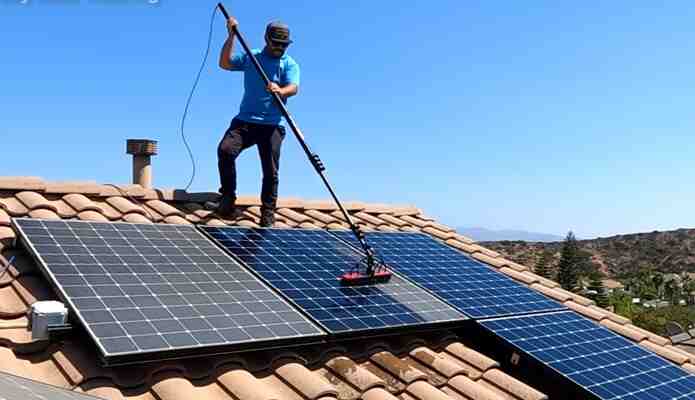
The Importance of Solar Panel Cleaning
Cleaning solar panels is an important aspect of solar panel maintenance that is often overlooked by many solar panel owners. The importance of solar panel cleaning cannot be overstated, as it directly affects the efficiency and longevity of your solar energy system. Here are some key reasons why solar panel cleaning is crucial:
1. Maintaining Efficiency:
The primary purpose of solar panels is to convert sunlight into electricity. Dust, dirt, bird droppings, leaves, and other debris can accumulate on the surface of the panels and reduce their ability to capture sunlight. Even a thin layer of dirt can significantly reduce the efficiency of solar panels, leading to decreased energy production. Regular cleaning helps to maximize energy production and the return on your investment.
2. Extending Lifespan:
Solar panels are designed to last for decades, typically with warranties ranging from 20 to 25 years. However, when dirt and debris are left to accumulate on the panels, they can create micro-scratches on the surface, which can eventually lead to more significant damage. Proper cleaning can prevent this damage and help extend the lifespan of your solar panels.
3. Cost Savings:
Clean solar panels are more efficient, meaning they generate more electricity from the same amount of sunlight. This increased efficiency can result in lower electricity bills or even excess energy that you can sell back to the grid. Over time, the savings on energy bills can offset the cost of cleaning, making it a cost-effective investment.
4. Environmental Impact:
Solar panels are an environmentally friendly way to generate electricity, as they produce no greenhouse gas emissions during operation. Keeping them clean ensures that they operate at their full potential, which maximizes the environmental benefits of your solar energy system.
5. Warranty Compliance:
Many solar panel manufacturers require proper maintenance, including regular cleaning, to keep their warranties valid. Neglecting to clean your panels could result in the loss of warranty coverage, leaving you responsible for repair or replacement costs.
6. Safety:
Cleaning solar panels often involves working at heights, which can be dangerous. It's important to hire professionals or take necessary safety precautions to prevent accidents or injuries during the cleaning process.
7. Aesthetics:
Clean solar panels look better and can enhance the appearance of your property. This can be especially important if your solar panels are visible from the ground or if you plan to sell your home in the future.
When it comes to cleaning solar panels, it's important to do it correctly to avoid damaging the panels or voiding warranties. Consider consulting with a professional solar panel cleaning service or following the manufacturer's recommended cleaning guidelines.
The frequency of cleaning may vary depending on your location and the environmental conditions, but a general guideline is to clean them at least once or twice a year and more frequently in dusty or heavily polluted areas.
Proper maintenance ensures that your solar panels continue to operate efficiently and provide you with clean, renewable energy for years to come.
Understanding Solar Panel Cleaning Tools
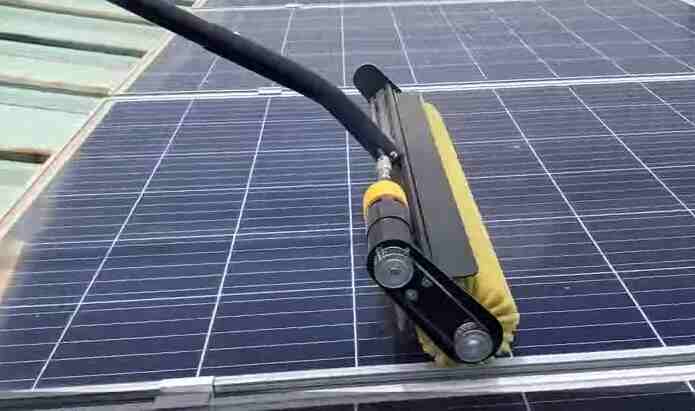
Cleaning solar panels is an essential part of solar panel maintenance to ensure they operate at their maximum efficiency. Here's an overview of some common solar panel cleaning tools and their uses:
1. Brushes:
Soft Bristle Brushes:
Soft-bristle brushes are commonly used for cleaning solar panels. They are gentle on the panel's surface to avoid scratching or damaging the glass. These brushes are typically attached to extension poles for easy access to panels mounted on rooftops.
Rotating Brushes:
Some specialized brushes have rotating or oscillating heads, which can help dislodge stubborn dirt and debris more effectively. They may be powered by an electric motor or water pressure.
2. Cleaning Solutions:
Mild Detergents:
Using a mild detergent mixed with water can help break down and remove dirt, bird droppings, and other contaminants from the solar panel's surface. Avoid using abrasive or harsh chemicals as they can damage the panel's coating.
DI Water (Deionized Water):
DI water is purified and has had most of its ions removed, making it excellent for cleaning solar panels without leaving mineral deposits or streaks.
3. Extension Poles:
Extension poles are essential for reaching and cleaning solar panels mounted on rooftops or other elevated locations. They come in various lengths and materials (e.g., aluminum, fiberglass) and often have interchangeable attachments like brushes or squeegees to clean the panels effectively.
4. Pressure Washers:
Pressure washers are powerful tools that use high-pressure water streams to clean surfaces. While they can be used to clean solar panels, caution is needed. High-pressure water can potentially damage the panels or their seals if not used correctly. Use a low-pressure setting or a specialized solar panel cleaning attachment if you decide to use a pressure washer.
Remember these key tips when using these tools for solar panel cleaning:
- Work during cooler parts of the day to prevent thermal shock from rapid temperature changes.
- Use deionized water or a mild detergent solution to clean panels.
- Avoid abrasive tools or harsh chemicals that could scratch or damage the glass.
- Use extension poles and safety equipment when working at heights.
- Follow manufacturer recommendations and safety guidelines for all equipment.
Regular maintenance and cleaning of solar panels can help maintain their efficiency and prolong their lifespan, ultimately ensuring you get the most out of your solar energy system.
Choosing the Right Tools
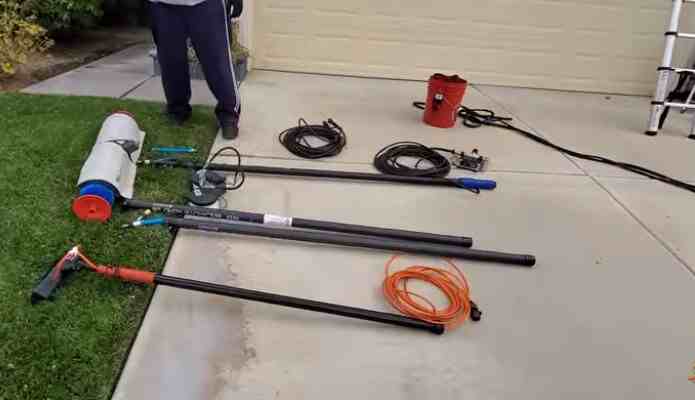
Choosing the right tools for various tasks, such as painting, cleaning, or pressure washing, is essential to ensure efficiency and effectiveness. Here are some considerations for each of the mentioned categories:
1. Considerations for Brushes:
Brush Type:
Choose the right brush type for your specific task. For example, flat brushes are great for large surfaces, while angled brushes are ideal for cutting in corners and edges.
Bristle Material:
Bristles can be natural (like hog hair) or synthetic (nylon or polyester). Natural bristles are best for oil-based paints, while synthetic bristles are suitable for water-based paints.
Size:
Consider the size of the brush relative to the surface you're working on. Larger brushes cover more area but may not be suitable for detailed work.
Handle:
Ensure the handle is comfortable to hold for extended periods and provides good control.
2. Choosing the Right Cleaning Solutions:
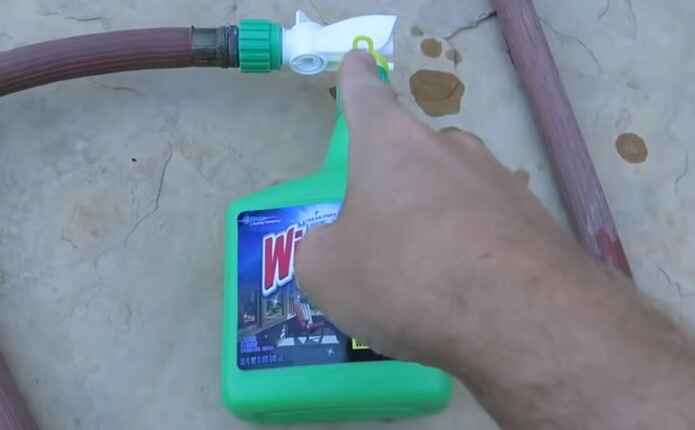
Surface Material:
Consider the material you're cleaning (e.g., wood, glass, tile, metal) and choose a cleaning solution that is compatible with it.
Cleaning Purpose:
Determine the purpose of cleaning (e.g., removing stains, disinfecting, degreasing) to select the appropriate cleaning solution.
Environmental Impact:
Opt for eco-friendly or biodegradable cleaning solutions whenever possible to minimize environmental impact.
Concentration:
Follow the manufacturer's instructions regarding the dilution ratio of the cleaning solution for effective and safe cleaning.
3. Choosing the Appropriate Extension Poles:
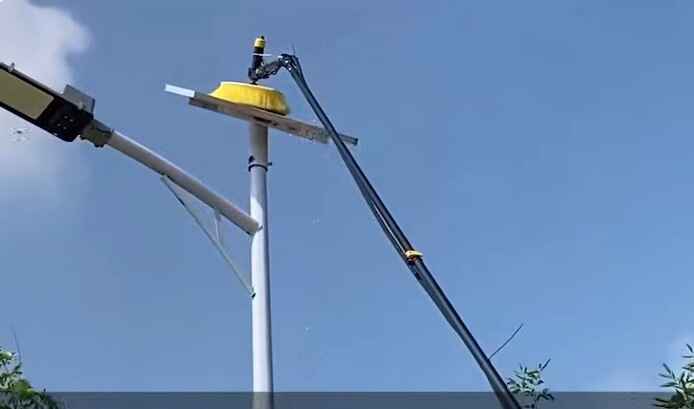
Material:
Extension poles are available in various materials like aluminum, fiberglass, and wood. Choose a material that suits your budget and the intended use. Aluminum is lightweight and durable, while fiberglass is non-conductive, making it suitable for electrical work.
Length:
Select the right length based on the height and reach needed for your task. Telescopic extension poles offer adjustable lengths for versatility.
Thread Type:
Ensure the extension pole has a compatible thread type to attach the tools or attachments you intend to use, such as paint rollers or cleaning brushes.
4. Choosing the Right Pressure Washers:
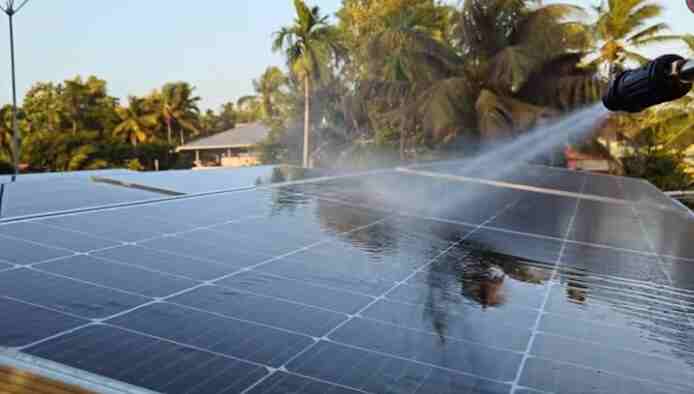
Pressure Rating:
Consider the pressure rating (measured in PSI - pounds per square inch) needed for your specific cleaning task. Higher PSI is suitable for tougher jobs, while lower PSI is more appropriate for delicate surfaces.
Flow Rate (GPM):
Look at the gallons per minute (GPM) rating, which indicates the water flow. Higher GPM can help clean faster but may require more water.
Power Source:
Pressure washers can be electric or gas-powered. Electric models are quieter and more suitable for smaller tasks, while gas-powered models offer more power but are noisier.
Accessories:
Check for compatible accessories like nozzles, hoses, and surface cleaners to enhance the versatility of your pressure washer.
Always read the manufacturer's instructions and safety guidelines for the tools and equipment you choose. Additionally, consider personal protective equipment (PPE) such as gloves, goggles, and masks to ensure your safety while using these tools.
Safety Measures while Cleaning Solar Panels
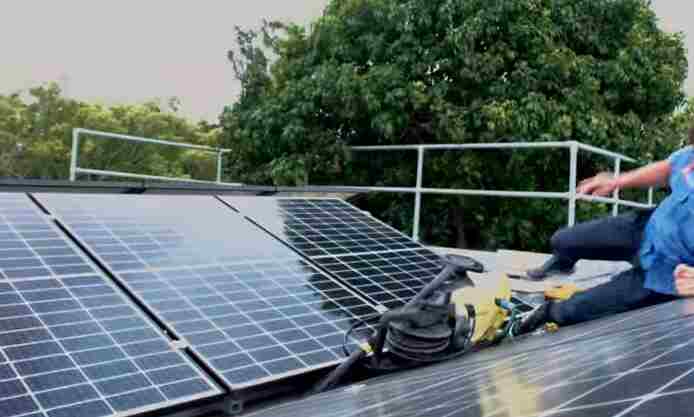
Cleaning solar panels requires some safety measures to protect both the person performing the cleaning and the integrity of the solar panels themselves. Here are two essential safety measures to consider:
1. Personal Protective Equipment (PPE):
Safety Glasses:
Wear safety glasses or goggles to protect your eyes from any debris or cleaning solution splashes.
Gloves:
Use chemical-resistant gloves when handling cleaning solutions to prevent skin contact and potential chemical burns.
Footwear:
Wear slip-resistant, closed-toe shoes or boots to prevent slipping or injuries from dropped tools.
Sun Protection:
Depending on the location and weather, consider wearing sunscreen, a wide-brimmed hat, and long-sleeved clothing to protect your skin from the sun's harmful rays.
Respiratory Protection:
If you are using any cleaning solutions that emit harmful fumes or aerosols, wear a mask or respirator to protect your respiratory system.
2. Safe Handling of Cleaning Solutions:
Use Approved Cleaners:
Only use cleaning solutions that are recommended by the solar panel manufacturer. Avoid using abrasive or harsh chemicals that can damage the panel's surface or coating.
Dilution and Mixing:
If you need to dilute the cleaning solution, follow the manufacturer's instructions carefully. Always add the cleaning solution to water, not the other way around, to prevent splashing.
Proper Storage:
Store cleaning solutions in their original containers, tightly sealed, and away from direct sunlight or heat sources. Keep them out of reach of children and pets.
Ventilation:
Ensure good ventilation when working with cleaning solutions to prevent inhaling harmful fumes. If you are working in an enclosed space, use appropriate exhaust fans or wear a respirator.
Labeling:
Clearly label containers with the contents and hazard warnings to prevent accidental misuse.
Emergency Response:
Have an emergency response plan in place, including access to eyewash stations and emergency showers in case of accidental exposure to chemicals.
Additionally, here are some general safety tips:
Turn Off the System:
Before cleaning, turn off the solar panel system to avoid electric shock. Disconnecting from the grid or disabling the inverter is usually sufficient.
Check the Surface:
Inspect the panels for damage before cleaning. Cracked or damaged panels should be handled with extra care or repaired by a professional.
Use Proper Tools:
Use soft brushes or squeegees with non-abrasive surfaces to clean the panels. Avoid using abrasive scrubbers or sharp objects that can scratch the glass.
Avoid High Temperatures:
Cleaning should ideally be done in the morning or evening to avoid hot surfaces that can cause rapid drying of cleaning solutions, leaving streaks or residues.
Remember that safety is paramount when cleaning solar panels. Always prioritize your well-being and adhere to safety guidelines to prevent accidents and damage to your solar panel system. If you are not comfortable with the cleaning process, consider hiring a professional to do the job safely and effectively.
Professional Solar Panel Cleaning Tools
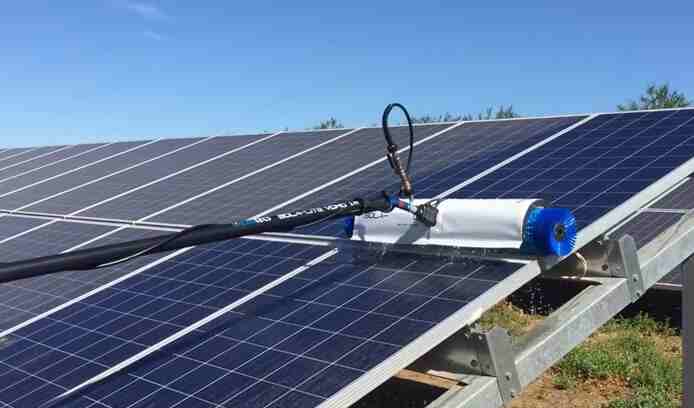
Professional solar panel cleaning tools are essential for maintaining the efficiency and longevity of solar panels. Two common types of professional tools used for cleaning solar panels are:
1. Automated Cleaning Systems:
Automated cleaning systems are designed to efficiently clean solar panels without the need for manual intervention. These systems are often used for large-scale solar installations, such as solar farms and commercial rooftops. Some common types of automated cleaning systems include:
Robotic Cleaners:
These are autonomous robots equipped with brushes, wipers, or cleaning mechanisms designed to move across the surface of solar panels, removing dirt, dust, and debris. They are programmable and can navigate the panel array systematically.
Water-Based Systems:
Water-based automated systems use a combination of water jets, brushes, and cleaning solutions to wash away dirt and grime. They may also include squeegees or air blowers to dry the panels after cleaning.
Trackers with Cleaning Modules:
Some solar panel tracking systems come with integrated cleaning modules that can periodically clean the panels as they adjust their orientation to maximize sun exposure.
Automated Drones:
Drones equipped with cleaning mechanisms are used to clean solar panels on large installations. They can access hard-to-reach panels and provide efficient cleaning.
2. Professional Cleaning Kits:
Professional cleaning kits are manual tools and equipment that are suitable for smaller-scale solar panel systems, residential installations, or situations where automated systems are not cost-effective. These kits typically include the following components:
Soft Bristle Brushes:
Soft brushes are used to scrub the surface of solar panels gently. They should be non-abrasive to avoid scratching the glass.
Telescopic Poles:
Telescopic poles with adjustable lengths help reach panels that are difficult to access. They can be attached to the brush or other cleaning attachments.
Deionized Water Systems:
Some professional kits include deionized water systems that can help prevent mineral deposits and streaks on the solar panels.
Cleaning Solution:
Mild, non-abrasive cleaning solutions specifically designed for solar panels can be used to break down and remove stubborn dirt and grime.
Squeegees and Wipers:
These tools are used to remove excess water and cleaning solution from the panels, leaving them streak-free.
Safety Equipment:
Safety gear such as gloves, safety glasses, and non-slip footwear may also be included in professional cleaning kits to ensure the safety of the person performing the cleaning.
The choice between automated cleaning systems and professional cleaning kits depends on the scale of the solar installation, budget considerations, and the specific needs of the solar panel maintenance task. Automated systems are more efficient for large installations, while professional kits are suitable for smaller setups or occasional cleaning needs.
Maintenance and Care of Solar Panel Cleaning Tools
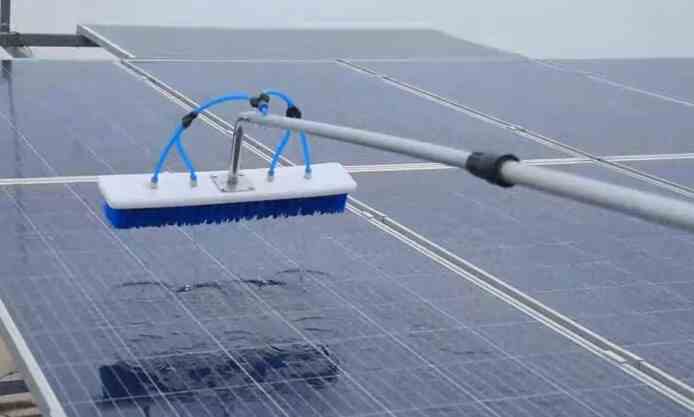
Proper maintenance and care of solar panel cleaning tools are essential to ensure their longevity and effectiveness in keeping your solar panels clean and efficient. Here are some guidelines to follow:
1. Regular Cleaning of Cleaning Tools:
After each use, make sure to clean the cleaning tools thoroughly. Remove any dirt, debris, or residue from the tools.
For squeegees, brushes, and other cleaning attachments, use a mild detergent or soapy water to clean them. Rinse them thoroughly to remove all soap residues.
2. Inspect for Damage:
Regularly inspect your cleaning tools for any signs of wear and tear. Look for loose bristles on brushes, damaged squeegee blades, or bent handles.
Replace or repair damaged parts promptly to maintain the effectiveness of the tools.
3. Handle Cleaning Tools with Care:
Be gentle when using cleaning tools on your solar panels. Avoid applying excessive pressure, which could scratch the glass or damage the panel's surface.
If you're using a water-fed pole system, take care not to drop the pole or let it collide with the solar panels.
4. Store Tools Properly:
Store your cleaning tools in a dry and clean environment to prevent rust or deterioration.
Hang squeegees and brushes to allow them to air dry completely before storage.
5. Check Water Quality:
If you're using a water-fed pole system or a pressure washer, ensure that the water source is clean and free from contaminants that could clog the system or leave residues on the solar panels.
6. Maintain Water Filtration Systems:
If your cleaning equipment uses water filtration systems, make sure to replace filters according to the manufacturer's recommendations to maintain water quality and system efficiency.
7. Regularly Grease Moving Parts:
If your cleaning tools have moving parts or hinges, apply a small amount of lubricant or grease to keep them in good working condition.
8. Protect from Extreme Weather:
Store your cleaning tools indoors during extreme weather conditions, such as freezing temperatures, to prevent damage from frost or excessive heat.
9. Follow Manufacturer Instructions:
Always follow the manufacturer's instructions for maintenance and care specific to your cleaning tools. Different tools may have unique requirements.
10. Safety Considerations:
Ensure that you use appropriate safety gear when cleaning solar panels, especially if you're working at heights or in challenging conditions.
By following these maintenance and care guidelines, you can extend the lifespan of your solar panel cleaning tools and help ensure they continue to clean your panels effectively, ultimately maximizing the efficiency and lifespan of your solar panel system.
Conclusion
In conclusion, maintaining clean solar panels is crucial for optimizing energy production and prolonging the lifespan of your solar power system. Solar panel cleaning tools, from simple brushes to advanced robotic cleaners, offer efficient solutions to this essential task. Whether you choose manual tools or embrace automation, regularly cleaning your solar panels ensures they operate at peak efficiency, saving you money and reducing your environmental footprint. With the right tools and a commitment to maintenance, you can harness the full potential of solar energy for years to come.
Frequently Asked Questions
1. How often should I clean my solar panels?
Solar panels typically require cleaning every 6 months to a year, but this can vary based on your location and local weather conditions. Regular inspection can help determine when cleaning is necessary.
2. Is it safe to use a rotating brush to clean solar panels?
Using a soft-bristle brush or a rotating brush with gentle pressure can be safe for cleaning solar panels, but avoid abrasive materials that may scratch the surface. Always follow the manufacturer's cleaning recommendations.
3. Can I use a homemade solution to clean my solar panels?
Yes, you can use a homemade solution of mild dish soap and water to clean solar panels. Mix it in a bucket, apply with a soft brush or sponge, and rinse thoroughly with clean water. Avoid using abrasive or chemical cleaners.
4. Is there any risk involved in cleaning solar panels myself?
Cleaning solar panels yourself carries some risk, such as slipping on a roof or damaging panels if not done carefully. If you're uncomfortable or inexperienced, consider hiring a professional to ensure safety and panel integrity.